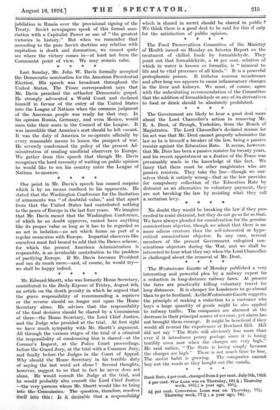Mr. Edward Shortt, who.-was formerly Home Secretary, contributed to the
Daily Express of Friday, August 8th, an article on the death penalty in which he argued that the grave responsibility of recommending a reprieve or the reverse should no longer rest upon the Home Secretary alone. He advises that the responsibility of the final decision should be shared by a Commission of three,---the Home Secretary, the Lord Chief Justice, and the Judge who presided at :the trial. At first sight we have much sympathy with Mr. Shortt's argument. All through the various stages of the trial of a criminal the responsibility. of .condemning him is shared—at the Coroner's- Inquest, at the Police Court proceedings, before the Grand. Jury, at the trial with a Common Jury, and finally before the Judges in the Court of Appeal. Why should the Home Secretary in his terrible duty of saying the last 'word act alone ? Second thoughts, however, suggest to us that in fact he never does act alone. He would Consult the Judge at' the trial, and he would probably also consult the Lord Chief Justice —the very persons whom- Mr. Shortt would like to bring into the Commission: The question, therefore, resolves itself into this ; Is it desirable that a responsibility which is shared in secret should be shared in public ? We think there is a good deal to be said for this if only for the satisfaction of public opinion.


































 Previous page
Previous page